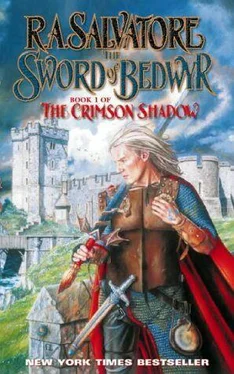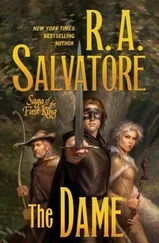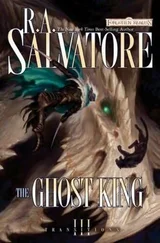“I do not care.”
Oliver was afraid Luthien would say that.
Before the next dawn, the two companions were creeping along the city’s dividing wall at the base of the Ministry. They got over the divider easily enough, and Oliver, knowing the routine, positioned them in the shadows of the cathedral’s northern wing: a transept, one of two armlike sections of the long building that gave it the general shape of a cross. Few buildings were close to the cathedral on this side, forming an open plaza. “We must go in the west end,” Oliver explained, peeking around the edge of the huge transept wall, and he told Luthien to put away the cape.
Luthien did as instructed, but he was hardly conscious of the act. This was the closest he had been to the Ministry, and how small the young Bedwyr felt! He looked straight up the side of the building’s wall to the tremendous flying buttresses and many gargoyles hanging out over the edge to look down upon puny humans such as he. Ominous and imposing was Montfort’s Ministry in the growing light of predawn.
Soon after the sun came up, the plaza was buzzing with many people, merchants and craftsmen, and quite a few Praetorian Guards, as well. Luthien noted that many of the people had brought their children along with them.
“The last day of the week,” Oliver explained, and Luthien nodded, realizing that another week, and the whole month of September, had indeed passed them by. “Tax day. They bring their children in the hope of mercy.” Oliver’s ensuing snicker showed that he did not think mercy a likely thing for any of them.
They waited inconspicuously behind the transept as the Ministry’s tall and narrow oaken doors were unlocked and opened at the west end, and the procession made its way into the giant structure, one group at a time. Burly cyclopians stood to either side of the doors, asking questions, herding the men and their families as they would sheep.
Oliver pulled Luthien further back into the shadows of the wall as a caravan of ironbound wagons rolled up to the side door in the middle of the transept’s north-facing wall, another impressive portal, though not as huge as the cathedral’s towering western doors. Many Praetorian Guards came out of the cathedral to meet the transported prisoners—four men, three women, and two dwarves, all dressed in loose-fitting gray robes, mostly open at the front. Luthien recognized the one who had helped him and Oliver immediately, from the dwarf’s bushy blue-black beard poking out under the cowl of his robe, and by his clothes, the same sleeveless leather tunic he had been wearing that morning in Morkney Square.
“Shuglin,” the young Bedwyr mouthed silently, remembering the name Siobhan had told him.
He motioned to Oliver, but the halfling held him back firmly. Luthien threw a plaintive look at the halfling.
“Too many,” Oliver mouthed, and pointed to a structure across the plaza from the prisoner wagons. Luthien noticed several forms milling about this smaller building and a couple sitting on the cobblestones like the beggars who were more common to the city’s lower section. They were fully cloaked, their faces hidden, but scrutinizing them more closely now, Luthien understood his partner’s concern.
Each one of them was broad-shouldered like a warrior, or like a cyclopian.
“Do they expect us?” Luthien whispered in Oliver’s ear.
“It would be an easy trap,” the halfling replied. “An easy way to be rid of a growing problem. Perhaps they understand how stupid you can be.”
Luthien glared at him, but standing beside that tremendous structure, the day brightening around them, the streets and cathedral teeming with Praetorian Guards, Luthien couldn’t honestly refute the halfling’s insult. He didn’t want to leave, but instead wondered what in the world he might do.
When he looked back at Oliver, his expression went from crestfallen to curious. The halfling had tucked his dark jacket, his black shoes and his hat away in pouches, had rolled his pant legs up even higher, and was in the process of slipping into the printed dress of a young girl. That done, Oliver produced a horse-hair wig, long and black (where he had gotten that, Luthien had no idea), then wrapped veils about his head, strategically covering his mustache and goatee.
Good old Oliver, Luthien thought, and he had to fight hard to keep his laughter from bursting forth.
“I am your virgin daughter, merchant-type,” the halfling explained, handing Luthien a pouch that jingled with coins. Luthien opened it and peeked in, and his eyes went wide to see that the coins were gold.
Oliver took him by the arm and led him boldly around the corner of the transept. They gave the prisoner wagons and the cyclopians a wide berth, moving near the center of the plaza as they made their way up to the Ministry’s western door.
That western wall held Luthien’s attention all the way to the door. It was not flat, but rather filled with niches, and in these were beautiful, brightly painted statues. These were the figures of Luthien’s religion: the heroes of old, the shining lights of Eriador. He noted that they had not been maintained of late, their paint chipping and peeling, and the nests and droppings of many birds evident in nearly every niche.
The young Bedwyr was beginning to work himself into quite a state, but Oliver’s unexpected outburst broke into his private thoughts.
“I told you that we would be late, Papa!” the halfling wailed in a high-pitched voice.
Luthien glanced incredulously the halfling’s way, but straightened immediately and eyed the two amused cyclopian guards. “Are we too late?” he asked.
“’E’s afraid of the mines for missing the tax call,” one of the brutes remarked, and it blinked lewdly as it regarded Oliver. “Or might be that Morkney’ll take his little daughter.” The wicked laughter that followed made Luthien want to go for his hidden sword, but he held steady.
Oliver nudged him hard, and when he looked at the halfling, Oliver motioned fiercely for the pouch.
Luthien nodded and grabbed a few gold coins. He’d owe Oliver dearly for this; he knew how hard it was to part the halfling from his ill-gotten gains!
“Are you sure that I am late?” Luthien asked the cyclopians. They looked at him curiously, their interest apparently piqued by his sly tone.
Luthien looked up and down the near-empty plaza, then inched his coin-filled hand toward them. The dimwitted cyclopians caught on.
“Late?” one asked. “No, you’re not late.” And the brute stepped aside and drew open one of the tall doors, while its companion eagerly scooped up the bribe.
Luthien and Oliver entered a small and high foyer, barely a five-foot square, with doors similar to the outside pair looming directly before them. They both breathed easier when the cyclopians shut the outside doors behind them, leaving them alone for the moment.
Luthien started to reach for the handle of an inside door, but Oliver stopped him and put a finger to pursed lips. They moved their ears against the wood instead, and could hear a strong baritone voice calling out names—the tax roll, Luthien realized.
They had come this far, but what were they to do now? he wondered. He looked to Oliver, and the halfling nodded in the direction over Luthien’s shoulder. Following the gaze, Luthien noticed that the foyer was not enclosed. Ten feet up the middle of both side walls were openings leading straight in, to concealed corridors that ran south along the front wall of the structure.
Out came the magical grapnel, and up they went. They passed several openings that led onto a ledge encircling the cathedral’s main hall, and came to understand that this corridor was the path used by the building’s caretakers to clean the many statues and stained-glass windows of the place.
Читать дальше









